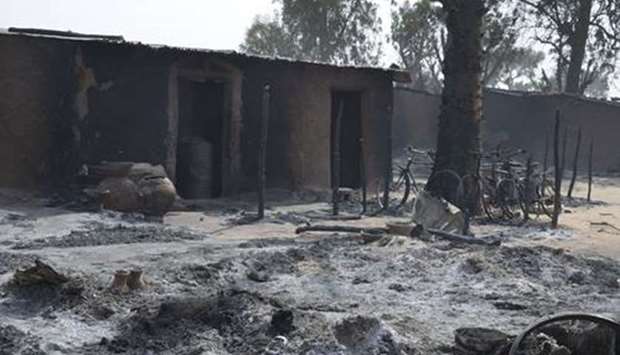The attacks came as Nigeria's military again maintained the jihadists had been defeated, and that its repeated raids and suicide bombings were "a sign of weakness".
At least 20,000 people have been killed in nearly nine years of violence and more than 2.6 million made homeless, triggering a humanitarian crisis across the Lake Chad region.
Bulama Bukar said Boko Haram fighters stormed his village, Alau-Kofa, about 8:00 pm (1900 GMT) on Sunday, firing guns and rocket-propelled grenades.
"Two people were burnt alive and the whole village was burnt, along with our food," he told AFP.
Bukar, whose father was shot in the leg during the attack, said the jihadists "specifically came to steal our cattle" but were forced to abandon the herds when soldiers arrived.
"Last Wednesday they attacked the village, killed three people and took away 50 cattle. And now they came back," he added.
A security source 12 kilometres (7.5 miles) away in the Borno state capital Maiduguri, confirmed Bukar's account.
"It is part of the fightback strategy by the terrorists, who are facing mounting pressure from the military," he said.
Another security source in Cameroon said "six people were killed and the attackers burnt down more than 100 houses" in the village of Hitawa, at about 11:00 pm on Sunday.
Repeated claims
Nigeria's military said last week they had cleared the Sambisa Forest in Borno state of Boko Haram fighters -- just over a year after making a similar claim.
Major General Rogers Ibe Nicholas, leading operations against the jihadists, was reported as saying on Monday that the Islamic State affiliate was "completely defeated".
Asked about the claim, he told AFP: "In the Sambisa Forest where we have them, we have completely defeated them."
The military was "taking them on wherever they go outside that area, he added. He attributed Sunday's attack in Alau-Kofa to "criminals who came to steal goats".
At a meeting with the military and security agencies in Maiduguri, Nigeria's Information Minister Lai Mohammed said: "The last phase of the war with Boko Haram is now on.
"The military is punching deep into the enclaves of the insurgents," he said, adding that the group was only able to mount "cowardly attacks on soft targets".
"That, in itself, is a sign of weakness," he added.
There have been repeated assertions that military operations were in the final stages dating back even further to the previous administration.
Nigerian President Muhammadu Buhari first claimed the jihadists were "technically defeated" in December 2015.
But the security source warned against triumphalism, despite recent successes.
"They have indeed been pushed out of Sambisa. They have relocated their camps to Dubur and Yuwe on the rear fringes of Sambisa."
Chibok girls 'at risk'
Boko Haram's capacity has been weakened since it controlled swathes of territory in northeast Nigeria in 2014 but it still poses a threat.
The BBC last month said the militants killed at least 967 people in 150 attacks in 2017, up from 910 deaths in 127 attacks the previous year.
Civilians remain at risk, particularly in remote rural areas and even in more well-guarded camps for people displaced by the conflict.
This and a recent federal government request for an extra $1 billion for security funding have led to questions about the veracity of claims about the end of the conflict.
Similarly, the military has been asked why it needs 12 Super Tucano A-29 ground aircraft from the United States if the militants are scattered and on the run.
The air force said last month the aircraft were required "to consolidate on successes recorded so far."
The security source said troops on the ground remained cautious about hunting down Boko Haram factional leader Abubakar Shekau, as he was using hostages as human shields.
They include some of the schoolgirls abducted from the Borno town of Chibok in April 2014 and female police officers seized in an ambush last year.
"They don't want to harm them, which is why they are limiting aerial offensives," he added.

